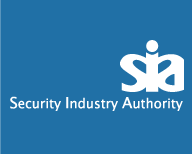
The (Private Security industry) or PSIA is governed by the Private Security Industry Act 2001.
The main aims of the PSIA 2001 are to:
- Raise standards of companies and individuals working within the Private Security Industry
- Licence individuals in specific sectors of the Private Security Industry
- Monitoring the activities and effectiveness of those working within the Private Security Industry
The Security Industry Authority (SIA)
Formed under the Private Security Industry Act 2001 is the governing body of the PSIA 2001 and as such, is responsible for:
- Setting and approving standards of conduct and training within the private security industry
- The compulsory licensing of individuals and companies
- Manage the ‘Approved Contactor Scheme’ (ACS). The ACS measures companies against independently assessed criteria. Privileged companies can advertise their membership to the SIA. This intern may give a company a competitive advantage over another company who does not have ACS status.
Any individual who wants to work in the security industry for a company that supplies security staff must have a SIA licence to practice. To work as a security operative without a SIA licence is now a criminal offence. Anybody found to be working as a security operative without a current SIA licence can be fined up to £5,000 and or spend up to 6 months in prison.
To obtain an SIA licence you need to attend and pass a course containing minimum Guided learning hours (GLH).
Once you have passed your course you can apply to the SIA for an application form. You will then send in your completed application form together with the appropriate licence fee and identification and the SIA will conduct a Criminal Records Bureau (CRB) check on you. If you have not been a resident of the UK consistently for the past 5 years, you must get a criminal record check done from your Country of origin before you apply for the SIA licence. Licence applications tend to take between 3 – 6 weeks. Your SIA licence will be valid for 3 years, after which time you will have to renew it.
Security can be provided in three different methods
Manned Security
Where one or more security staff patrols premises this method is costly but effective. A manned presence can deter crime from happening and provide an immediate response to situations as they occur.
Physical Security
Physical Security refers to physical deterrents such as security fencing around a building, Locks, barriers etc. All of which reduce the likelihood of crime.
Systems
Systems refer to electrical systems in place to prevent or deter crime or incidents from happening. Examples would be intruder alarms, Close Circuit Television (CCTV), fire alarms etc.
Career opportunities within the Security Industry
Definition of a ‘Security Operative’
‘A person paid or used to provide any form of manned security to a person or premises’
There are currently over half a million people employed within the UK’s security industry. The security industry is one of the only industries that continue to grow.
As security operative has many different avenues to progress along. Security operatives are usually employed by a security provider company. Security provider companies usually provide security services to a number of different clients under contract.
There are many progression routes within the security industry once employed. Once you are employed there are usually additional courses available to up-skill you in your chosen career path. Many Security providing companies now offer apprenticeships for new staff and NVQ’s to existing staff. Depending of the size of the Security Providing Company your progression routes could include, supervisor, team leader, area manager and regional manager. Other roles include becoming a trainer, assessor, accounts managing etc.
There are a number of different roles within the Security Industry.
Door Supervisor
You would usually find a Door Supervisor standing at the front door of licensed premises. Their main role is to ensure the customers have a safe and enjoyable experience. Part of their role involves monitoring the access of customers based on suitability criteria. They must first complete a Door Supervisor course before starting any type of employment.
Security Guard
Security Guards are in-charge of the security of property, safety of people and the protection of valuables. You will find lots of different types of ‘Security Guards’. You will notice (also known as ‘Patrol’) security guards looking after large empty premises, building sites and patrolling around large buildings and factories. Their main role is to act as deterrent to criminals and respond to any suspicious activities or abnormalities. You will also notice (also known as ‘Retail) security guards patrolling around retail outlets and shops. These security guards main function is to act as a deterrent to thieves as well as prevent and detect criminal activities. In addition, some guarding companies provide a ‘Key Holding’ service where a ‘Security Guard’ attends to aid emergency services in entering the building outside of business hours.
CCTV Operator
A Close Circuit Television (CCTV) Operator is a person who monitors the activities of a member or members of the public in a public or private place. CCTV operators often assist ‘Security Guards’ and ‘Door Supervisors’ in situations where criminals are hiding from the ‘Security Operative’. The police often use CCTV operators to track criminals who are unlawfully at large. The police will often use the CCTV footage as evidence to be used when proving an offence by an individual(s).
Cash and Valuables in Transit Officer
These officers are often seen in specially adapted vehicles and wearing body armour and helmet for protection. A ‘Cash and valuables in transit officer’ is responsible for transporting and guarding valuables in the form of cash, Jewellery or other expensive and valuable items.
Close Protection Officer
Commonly known as CPO’s, Body Guards and Minders, Close Protection Operatives protect individual clients from deliberate attack, unwanted attention and are sometimes expected to put their live in jeopardy so save their client, often referred to as the ‘Principle’
Key bodies with the Security Industry Authority
There are many key bodies within the security industry. Companies who provide security as well as each SIA licensed individual is classed as a ‘partner’ within the security industry. The main objectives of the key bodies are to ensure that all Security Operatives are appropriately licensed, prevent crime and protect clients. Some of the key bodies include:
SIA (Security Industry Authority)
The government body set up to licence and regulate the private security industry in support of the Private Security Industry Act 2001.
Police
Security operatives work closely with the police to prevent and detect crime. Security operatives are now considered to be part of the wider police partnership. Part of the Polices role within the Security Industry Authority is to check to make sure that individual ‘Security Operatives’ are SIA licensed. As part of the Security Industry Act 2001, all working Security Operatives must have a SIA licence to practice worn on the outside of clothing with the photograph displayed at all times.
Relevant Local Authorities (councils)
Security Operatives may sometimes work for/with the local authorities. Relevant Local Authorities must ensure that it only employees Security Operatives that hold a current SIA licence.
Entertainment premises
To ensure that all security operatives used are appropriately trained and hold the relevant SIA licence to perform the expected duties.
